- Home
- Paullina Simons
The Tiger Catcher Page 38
The Tiger Catcher Read online
Page 38
“Or,” Julian said, “just one thing could’ve gone right. She could’ve lived.”
“But she does live, Julian,” Devi whispered from his corner, his voice filled with barren longing.
“I didn’t wash in urine or wine,” Julian said. “I didn’t wash in the blood of the lamb. I wasn’t sanctified or baptized. I wasn’t sacrificed. I wasn’t”—he broke off. “I wasn’t enough.”
The debriefing continued, the unpacking, the going over every word, every choice. “How could you have sent me so unprepared? I should’ve brought three sources of light, three! I had one. At the first sign of water, the light died. My piece of shit watch didn’t work. Got stuck on noon. I wasn’t warm enough, I wasn’t dry enough, I couldn’t climb, hold on to anything, the boots I never should’ve worn never dried, my jacket was too thick, but I couldn’t leave it because it had her beret in it. Devi! My God. I didn’t know I had to keep track of time.”
“As do we all,” Devi said. “And yet do we?” He paused. “And how would it have made a difference?”
“I didn’t know to look for evil inside Falk, inside Krea.”
“And if you knew?”
Dunham could’ve been the one. Or the boatman. There was danger everywhere. There was plague and dirt and oars. How did Julian know he was supposed to be looking out for such swift death? He raised his arm to cover his eyes so Devi wouldn’t see his devastated face—and stabbed himself in the cheek with the acupuncture needle impaled in his forearm.
Methodically Devi fixed the needle, wiping the blood off Julian.
“You know what would’ve made a difference?” Julian said. “A headlamp. You sent me into a cave without light. You didn’t tell me I had to leap over a black hole. Do you even know what the world record is in the long jump?” Julian thought he was ranting, asking a rhetorical question.
“Thirty feet,” Devi instantly replied.
Julian frowned—at what, at Devi’s insolence, at his ready response? “So you do know some things. How, because you’ve gone yourself, you’ve leapt over that canyon? And you’re here, so you came back. You knew it was possible!”
“No. It’s not what happened to me.”
“What happened to you?”
“Something else, and I do not wish to discuss it.”
“If you knew, why didn’t you tell me?”
“Tell you what?”
Julian groaned. “How unattainably far I had to leap.”
“And what would you have done if you knew?”
“Would that I’d had the opportunity to find out.”
“Well, now you know,” Devi said.
“What good is it now.”
“Now you’ve learned how far you can leap.”
“Not far enough.”
“Farther than anyone I’ve ever known.”
“Not far enough.”
***
Eventually he had to leave Devi’s, put on Sweeney’s coat, take a cab home. Devi gave him money. Julian forced himself not to look through his taxi windows at Old Street, at Goswell Road, the roads where he had just walked with her, a second ago, an infinity ago. He lay half sunk in the backseat waiting to turn off St. John’s. Hermit Street was clean and treeless, neat well-kept brick terraced houses with black doors, just like always. Nothing out of place. Except for him.
“Where you been, love,” Mrs. Pallaver said, opening the door and smiling. “Forgot your key again? You been gone for days.” She patted his arm as he limped past and then stared at him uncertainly. “When did you grow such a beard? And what happened to your lovely hair? I’ve never seen it so messy. Well, as long as you’re back, my dear.”
“I’m back.” He started up the stairs, holding on to the railing.
“Are you still planning to move out?” she asked. “Cause I have somebody interested in the room.”
“Yes, Mrs. Pallaver.”
“Are you all right, love? Would you like a cup of tea?”
“Yes, Mrs. Pallaver, please.” The kindness got to him.
Julian’s room was just as he’d left it. He ripped up the farewell note he had left for Ashton on the dresser. He sat on the bed. He lay on the bed, curled into a fetal circle of grief, clenching her red beret to his chest.
He had spent so many hours of his precious days in a dark buttery with buckets of suet instead of with her. He had lived through a miracle. He thought he had time. Nothing ahead of him but possibilities. He spent hours walking the mule back and forth from the market, gazing at the Fortune, getting stuck in the mud, harnessing, reining, loading, packing, unloading, unpacking. Planting her wedding flowers. Rolling barrels of water back and forth, empty, full, empty. And then exhausted he would sleep, and another day would begin and end, same as before, except for a few minutes when she was with him. They walked through Fynnesbyrie Field. He laughed at Lance and Crab. When she was Sebastian, she would rip off her wig and fling it at him, and he would catch it and hold it to his heart. With joy they waded in the River Fleet, trying not to slip on the wet moss stones.
Sweeney told him there was no break between the moment Julian was dressed and clean shaven and the moment he was undressed and bearded. Time remained at noon at zero meridian, and yet time had passed in the life of her soul, in the life of his soul.
She lived. And Julian lived with her.
Was it the past? Was it the future?
It was in another country. Time and space were coordinates of the material world. The place where Julian was with her had no material dimension. It just was.
***
He returned to work—for a day. It felt longer than his time in the cave. When four o’clock came, Julian went to human resources and asked for a leave of absence. He promised that when he got better, he’d be as good as new. They must have thought he was going to rehab, because Eleanor in HR signed his papers with fiery enthusiasm.
Julian was broken and needed to be repaired. Devi was unable to help with the unmistakable injury to his body. Reluctantly, Julian had to admit he needed a real doctor. He went to the National Health Walk-in Clinic. When they couldn’t help him—because they couldn’t find anything wrong with him—he went to St. Bart’s.
In the emergency room, he said there was something the matter with his heart. That got their attention. They triaged him stat, and then couldn’t find anything wrong with it.
I may’ve been hit by lightning, he said.
They took that seriously. After admitting him, they ran tests, asked questions. Trouble is, to get to the truth, you must know which tests to give, which questions to ask, and they did not. For example:
Why do you think you were hit by lightning?
I could’ve been electrocuted.
Why do you think that?
Because I feel an electromagnetic disturbance in my body.
You feel it right now?
I feel it right now.
They examined him. We can’t find any Lichtenberg figures on your skin, they said. Lightning burns, we call them, they look like black-and-blue flowers. They’re our first clue to the scope of the damage. The more flowers you have, the worse you got hit. You don’t have any. You have some burst capillaries around your hands and feet. You may have had some internal bleeding which healed on its own. Did you fall?
I didn’t fall. I told you what happened.
But were you hit by lightning? You said you think you were hit by lightning. Wouldn’t you know if you were?
I can’t remember. It may have zapped my memory. Something doesn’t feel right. Fix it. I’m moving apartments. I need to return to work. Just—fix it.
They did an EKG, a stress test. His heart was fine, no tissue damage, as often happened after an electrocution. When did this supposed event supposedly occur? they asked. We’ve had good weather in London, no storms, no thunder. In our medical opinion, you did not sustain a direct hit from a bolt of lightning. You would’ve melted from the current. You would’ve been carbonized.
“Perhaps I was car
bonized,” Julian said, staring out the window at the black and red rooftops, the tips of the trees just greening. “Carbonized, and then reformed, but put back together not one hundred percent correctly.”
Julian regretted saying that, because the stream of doctors returned not only with his medical file two inches thick, but with Dr. Fenton and Dr. Weaver in tow. Notes were exchanged, discussed, examined. They had meetings at the foot of his bed. Suddenly everything became about the girl.
Well, it was only right.
Everything was about the girl.
“Julian, why do you think you were hit by lightning?” Dr. Weaver asked, all pretend concern.
The grumpy but benevolent Fenton was actually concerned. “Julian, is this another one of your tricks to get me to prescribe more Klonopin? I’ve heard so many excuses from you, but this one, I must say, is one of your best.”
“Am I asking for Klonopin?” Why, why, why, why.
Intense heat from electrical current damages your lungs, they said. It expands the air inside them. Your lungs stretch. Sometimes they burst. We don’t see anything like that in your chest.
What do you see in my chest? Julian asked. Do you see my heart? Do you see my soul? Run your tests, tell me what you find.
“We see a man who is having hallucinations,” Weaver said.
Julian demanded that Weaver be taken off his case. He had a right to a different doctor. Weaver was making everything worse. Julian called for the hospital administrator. He was strapped to a blood pressure machine, and his vitals bore him out. Whenever Weaver spoke, Julian’s blood pressure spiked, and his heart rate shot up. They took Weaver off his rounds. A vindicated Julian felt better, rejuvenated by his anger.
The elderly and ineffectual Fenton stayed. Are you suffering from amnesia maybe? What year is it? What day is it?
Julian didn’t know what day it was.
Why, Julian, why do you think you were hit by lightning?
Because I feel there is no strength in my bones. There’s something in me that feels broken. Not a lot broken. A little broken. I used to be a boxer. I know about these things.
Fenton laughed. He thought Julian was joking. Then he turned serious but skeptical. Where does it feel you’re a little broken?
Everywhere, said Julian.
You sound confused, Fenton said. Were you hit on the head a lot when you were a boxer?
Finally, they found something. Julian had a ruptured ear drum! This was exciting. It would explain his pervasive dizziness, why he stumbled when he walked. They got excited, too. They took more X-rays and found hairline cracks in the navicular bones of his feet, the boat-shaped bones that connected the feet to the toes. That’s why it hurt so much when he walked. He remembered his friend Cedric in the stables telling him that horses frequently got this type of injury and had to be put down. Julian felt less grateful than he should’ve been that he wasn’t a horse.
He checked himself into a convalescent home in Hampstead Heath to recuperate. It was a live-in rehab facility for old people with broken hips and stroke patients who couldn’t manage on their own. They had a wellness counselor on premises, to help the elderly adapt to their permanent physical limitations. By far, Julian was the home’s youngest resident. The counselor, a well-meaning youth named Kenyon Reece with two years of vocational social services training diagnosed him with fibromyalgia!—a largely psychosomatic disorder of the central nervous system.
Julian slept fifteen hours a day, sat motionless in the garden.
After two weeks, with his body almost healed, he left but didn’t feel any better.
***
He needed to get himself together. Ashton was arriving soon. Julian had to pretend to be plugged back to life. So the shell that was Julian searched for new digs for him and his friend. Ashton wanted Notting Hill? Julian would deliver Ashton Notting Hill. It was the least he could do; after all, the guy was moving continents for him. He and Devi went looking together and found a spacious, renovated two-bedroom, two-bathroom flat on the third floor of a posh white townhouse. It had a large open-plan living area and kitchen, with a balcony overlooking a My Fair Lady street, three blocks from Portobello Road. There was even a palm tree outside to remind Ashton of home.
Julian’s appetite came back. He ate as if he hadn’t eaten in eight hundred years—four hundred there, four hundred back. He inhaled Devi’s Chinese chicken salad, soy garlic Korean beef, coconut rice. Pho. He ate and ate. “Had I stayed with her, honestly, I don’t know how I would’ve survived.”
“How long were you there? Was it years?”
“Why years?” After lunch Julian was back on Devi’s acupuncture table, his body slathered with balm and pierced with needles, frankincense burning around him. Devi was chanting, singing, praying.
“You look older.”
“Well, I’m not. It wasn’t even two months.”
Devi’s mouth got twitchy.
“What? Why are you looking at me like that?”
“I’m not looking at you.”
“You are literally staring at me with your evil eye. What?”
“Nothing,” Devi said. “Sometimes you get upset when I tell you things you don’t want to hear.”
“Fine, don’t tell me.”
“Why did you ask if you didn’t want me to tell you?”
“Fine, tell me.”
“I was thinking,” Devi said, placing a calming palm on Julian’s chest, “about how permanent the love is inside us, and yet how temporary our time is with it.”
“As always, you’re not helping.” Julian returned to his disquisition. “They had never heard of King Lear, Devi. They’d never heard of the King James Bible. They didn’t know what caused the plague. They painted their faces with lead. And my God, the way they dressed! Their collars were starched like plates around their necks. No one had buttons, everything was tied together with ribbons and rope, and there I was wearing a jacket with zippers on it. They might have burned me for witchcraft for the zippers alone. I was ridiculous. They made candles out of animal fat, have you any idea how disgusting that is? There isn’t going to be anything in my life more disgusting than that.”
“Famous last words,” Devi said.
“I did nothing but arouse suspicion. I didn’t know who the King was, who the Queen was. I didn’t know what day it was.”
“You still don’t.”
“They didn’t have potatoes, they didn’t have tea or corn. Everything I said was wrong. And I should’ve brought a backpack.”
“Would a backpack have helped you?”
“It wouldn’t have not helped me. You should’ve warned me, Devi. The long-jump record is thirty feet? I’m sure that jump was longer. I don’t know how I made it. By all rights, I should be dead. You didn’t tell me what was ahead of me. I wasn’t ready. I didn’t have enough time.” Julian closed his eyes.
“Enough time for what, Julian?” Devi said, his tone parental.
This time Julian ripped out the needle before covering his face with the crook of his arm. He railed about the idiotic bearable things because he couldn’t rail about the unbearable ones.
Oh, Mary.
He didn’t save her. He thought all he had to do was keep her from a terrible marriage and everything else would work itself out. But it didn’t. There was nothing else that mattered, nothing else that made one softened heart of difference.
His lamentations continued. “What do I know about the long jump? What do I know about how to approach a jump, the vital importance of the last two strides, how to take off properly, what to do with my body in the air, how to land? I impaled my calf on a rock, but I could’ve impaled my heart on a stake, jumping blind, flying blind, landing blind. I power sprinted in darkness. You should’ve told me to bring a retractable flexible pole for the vault. Am I Carl Lewis? Am I Jesse Owens?”
“Did you do it, or did you not do it?”
“Just dumb luck. I tried to run as fast as I could, thinking like an idiot that the s
peed at takeoff would propel me over the insurmountable distance.”
“The speed at takeoff is the single most important thing in the jump,” Devi said.
“I didn’t jump, Devi,” Julian whispered. “I flew.”
Okay, he didn’t bring a headlamp, but he held her in his arms again. He had glimpsed the immortal, had righted the bitter wrong of L.A. His faith had been answered. Why didn’t that feel like enough? There was nothing to be done about it now, but Julian couldn’t help but feel in his dank depression and occasional mania, filled to the brim with both ardor and sorrow, that if only he had brought three lights as he should have, if only he had made other decisions, tiny adjustments in his free choices, they might’ve accumulated into a different destiny for Mary. And therefore, into a different destiny for him.
49
The Lady, or the Tiger
JULIAN WAS WAITING FOR ASHTON AT ARRIVALS IN Heathrow. Ashton was tanned, blond, happy. He was wheeling a suitcase and a duffel.
“Jules, you showed up at the airport!” Ashton said with a delighted grin. “Are you trying to prove you’re not deranged?”
“Yes, or as it’s called everywhere else in the universe, being a friend, but whatever.” Julian smiled back.
“Same difference. Are we taking the tube? Fine, let’s go. I’m starved.” The men made their way to the people mover. “So what have you been doing with yourself?”
“Oh, you know,” Julian said with a shrug. “A little bit of this, a little bit of that.”
“What the hell is that on your face?”
Julian hadn’t shaved off the bushy facial hair that now curled and twined halfway down his throat. He stroked his beard. “You like it?”
“Are the razors being rationed again in London like during the war? Shaving cream, too? Scissors? No, it’s a good look for you. Perfect. You’ve heard of insect repellent? Well, what you’ve got going is a babe repellent.”

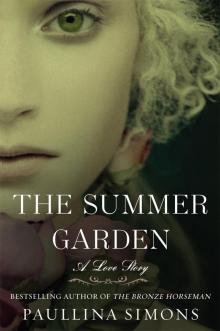 The Summer Garden
The Summer Garden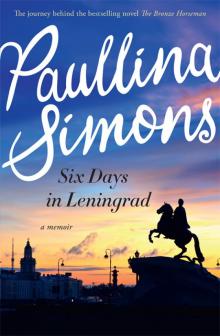 Six Days in Leningrad
Six Days in Leningrad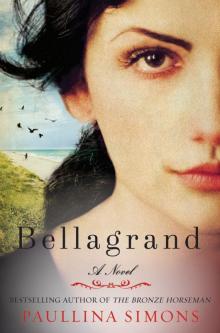 Bellagrand
Bellagrand Tatiana and Alexander
Tatiana and Alexander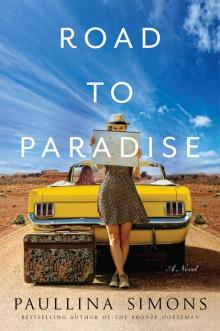 Road to Paradise
Road to Paradise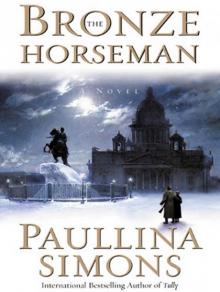 The Bronze Horseman
The Bronze Horseman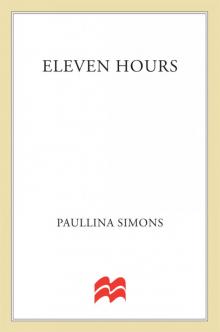 Eleven Hours
Eleven Hours Tatiana's Table: Tatiana and Alexander's Life of Food and Love
Tatiana's Table: Tatiana and Alexander's Life of Food and Love The Girl in Times Square
The Girl in Times Square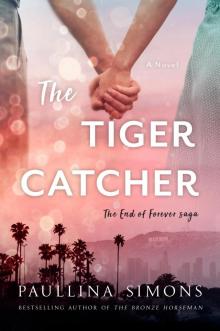 The Tiger Catcher
The Tiger Catcher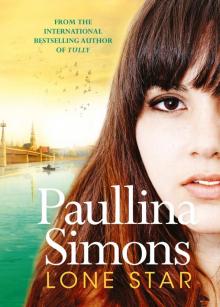 Lone Star
Lone Star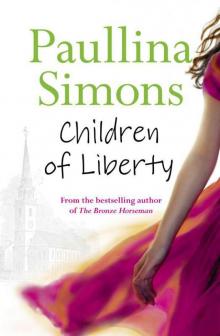 Children of Liberty
Children of Liberty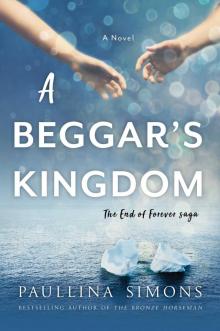 A Beggar's Kingdom
A Beggar's Kingdom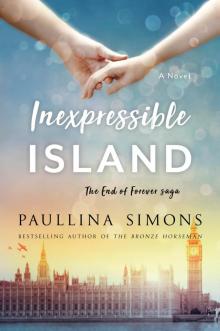 Inexpressible Island
Inexpressible Island Tatiana and Alexander: A Novel
Tatiana and Alexander: A Novel Tatiana's Table
Tatiana's Table A Song in the Daylight (2009)
A Song in the Daylight (2009)